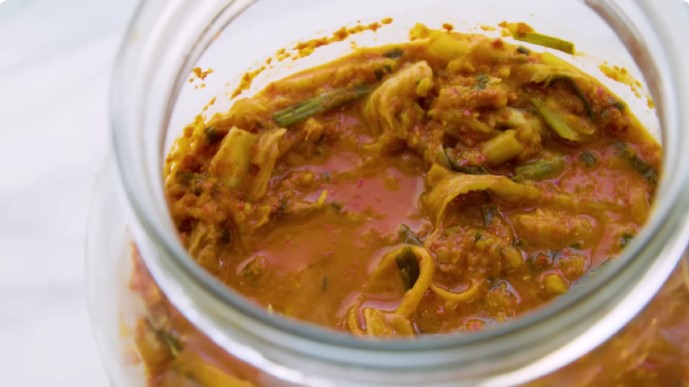Is Kimchi Halal
Kimchi, the quintessential Korean dish made of fermented vegetables, is renowned for its unique flavor, health benefits, and cultural significance. As Korean cuisine gains popularity worldwide, many people, including Muslim communities, are curious about whether kimchi is halal. This comprehensive guide will explore the ingredients, preparation methods, and considerations for ensuring kimchi aligns with Islamic dietary laws. Whether you’re a curious foodie or a devout Muslim seeking clarity, this article will provide all the information you need to make an informed decision about including kimchi in your diet.
What is Kimchi?
Kimchi is a traditional Korean side dish made primarily from fermented cabbage and radishes, seasoned with a variety of spices and flavorings. The fermentation process gives kimchi its distinctive taste, which can be spicy, sour, or savory, depending on the ingredients and preparation method. Common ingredients in kimchi include:
- Napa cabbage or Korean radish
- Salt
- Garlic
- Ginger
- Chili pepper
- Fish sauce or shrimp paste
- Scallions
Kimchi is not just a dish; it’s a cornerstone of Korean cuisine and culture, with numerous regional variations and recipes passed down through generations.

Halal Considerations for Kimchi
Key Ingredients
The primary concern for Muslims regarding kimchi is the presence of certain ingredients that may not be halal. Let’s examine some of the common components:
- Vegetables: The base of kimchi, such as Napa cabbage and radishes, is inherently halal.
- Salt, Garlic, and Ginger: These are also naturally halal and pose no issues.
- Chili Pepper: As a plant-based ingredient, chili pepper is halal.
- Fish Sauce or Shrimp Paste: These can be contentious. While seafood is generally considered halal, the processing and additional ingredients in fish sauce or shrimp paste need scrutiny. Some varieties may contain alcohol or non-halal additives.
- Scallions: Another plant-based ingredient, scallions are halal.
Fermentation Process
The fermentation process itself does not inherently make a food item non-halal. However, certain factors during fermentation, such as the use of alcohol or non-halal animal products, can affect the halal status. Traditional kimchi fermentation involves natural lactic acid bacteria, which is halal. The key is ensuring no non-halal substances are introduced during this process.
Ensuring Halal Kimchi
To ensure the kimchi you consume is halal, consider the following steps:
1. Check Ingredients
Carefully review the ingredient list on store-bought kimchi. Look for halal certification or specifically check for the absence of non-halal components like alcohol or non-halal fish sauce.
2. Make Your Own Kimchi
Making kimchi at home allows you to control every ingredient and ensure it meets halal standards. There are many recipes available that use halal substitutes for potentially problematic ingredients. For instance:
- Replace fish sauce with soy sauce or a halal-certified fish sauce.
- Ensure no alcohol or non-halal additives are used.
3. Look for Halal-Certified Brands
Many brands now offer halal-certified kimchi, making it easier for Muslims to enjoy this delicious dish without concerns. Look for reputable brands that provide clear halal certification on their packaging.
4. Purchase from Halal Stores
Buying kimchi from stores that specialize in halal foods can provide additional assurance. These stores are more likely to carry products that meet halal standards.
Where to Buy Halal Kimchi
Finding halal kimchi can be straightforward if you know where to look:
- Asian Grocery Stores: Many Asian grocery stores stock a variety of kimchi, and some may carry halal-certified options.
- Halal Markets: Specialty halal markets often have a selection of international foods, including halal kimchi.
- Online Retailers: Numerous online retailers offer halal kimchi, providing a convenient option for those who may not have access to specialized stores locally.
- Farmers’ Markets: Some local producers may offer halal kimchi, especially in areas with significant Muslim populations.
Taste and Variations
Halal kimchi does not have to taste different from traditional kimchi. By using halal ingredients and proper preparation methods, you can enjoy the same rich, complex flavors. There are many variations of kimchi, and experimenting with different recipes can yield delicious results that suit your personal taste preferences.
Frequently Asked Questions
Is kimchi vegan?
Traditional kimchi often includes fish sauce or shrimp paste, making it non-vegan. However, vegan versions of kimchi use plant-based ingredients and substitutes like soy sauce or seaweed.
Can kimchi be made without any seafood?
Yes, kimchi can be made without seafood. There are many recipes that use vegan-friendly substitutes like soy sauce or miso to achieve the umami flavor typically provided by fish sauce or shrimp paste.
Does kimchi contain alcohol?
Traditional kimchi fermentation does not typically produce alcohol in significant amounts. However, some commercial kimchi might include alcohol as a preservative, so it’s essential to check the label.
How long does it take to ferment kimchi?
The fermentation time for kimchi can vary. It can take anywhere from 1 to 4 days at room temperature, and up to several weeks in the refrigerator, depending on the desired taste and fermentation level.
Is kimchi safe to eat during pregnancy?
Kimchi is generally safe to eat during pregnancy if it is made with fresh, high-quality ingredients and stored properly. However, due to its strong flavors and spices, it might cause heartburn or discomfort for some pregnant women.
What are the health benefits of kimchi?
Kimchi is rich in vitamins A, B, and C, and is also an excellent source of probiotics due to the fermentation process. These probiotics can aid in digestion and boost the immune system.
How should kimchi be stored?
Kimchi should be stored in an airtight container in the refrigerator. Properly stored, it can last for several months, although the taste will continue to change as it ferments over time.
Can I freeze kimchi?
Yes, kimchi can be frozen to extend its shelf life. However, freezing may affect its texture and flavor. It’s best to consume it fresh or refrigerated for optimal taste.
Is kimchi spicy?
Kimchi is traditionally spicy due to the use of chili peppers. However, the level of spiciness can vary, and milder versions can be made by reducing or omitting the chili pepper.
Are there different types of kimchi?
Yes, there are over 100 types of kimchi, each with unique ingredients and preparation methods. Some popular varieties include Baechu kimchi (cabbage kimchi), Kkakdugi (radish kimchi), and Oi sobagi (cucumber kimchi).
Can I make kimchi without salt?
Salt is essential for the fermentation process of kimchi, as it helps to preserve the vegetables and inhibit the growth of harmful bacteria. However, low-sodium versions can be made using less salt.
How does the fermentation process work in kimchi?
The fermentation process in kimchi involves lactic acid bacteria converting sugars into lactic acid, which preserves the vegetables and gives kimchi its tangy flavor. This process also produces beneficial probiotics.
Is store-bought kimchi as healthy as homemade kimchi?
Both store-bought and homemade kimchi can be healthy, but homemade kimchi allows for control over ingredients and fermentation time, which can affect the probiotic content and overall nutritional value.
Can children eat kimchi?
Children can eat kimchi, but it is best to introduce it in small amounts due to its strong flavor and spiciness. Non-spicy versions can also be made for children to enjoy.
What are some dishes that can be made with kimchi?
Kimchi can be used in a variety of dishes, including kimchi fried rice, kimchi stew (kimchi jjigae), kimchi pancakes (kimchijeon), and as a topping for tacos and burgers. It adds a flavorful, tangy kick to many recipes.
Conclusion
Kimchi, with its rich flavors and health benefits, can be enjoyed by everyone, including those following halal dietary guidelines. By being mindful of ingredients, seeking halal-certified products, or making your own kimchi, you can savor this iconic Korean dish without compromising your beliefs. Whether you buy it from a store or prepare it at home, halal kimchi offers a delightful addition to any meal.
Read also: Bonchon Allergen Menu





